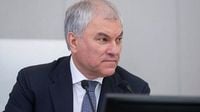In a significant move aimed at integrating migrant children into the Russian education system, authorities in Tatarstan have announced that over 45 schools will serve as testing sites for Russian language proficiency. This initiative is part of a broader national program, with a total of 3,174 educational organizations across Russia designated for this purpose, according to reports from TASS.
The implementation of these tests is a response to a new law signed by President Vladimir Putin in December 2024, which prohibits the enrollment of migrant children who do not possess adequate knowledge of the Russian language. This law is set to take effect on April 1, 2025, marking a pivotal change in the educational landscape for migrant families.
In Tatarstan alone, the establishment of more than 45 testing locations mirrors similar setups in other regions, including Volgograd, Nizhny Novgorod, Sverdlovsk, Chelyabinsk, Krasnodar, Bashkortostan, and Dagestan. Notably, the Samara and Rostov regions lead with the highest number of testing sites, boasting 665 and 1,064 locations, respectively.
The testing initiative will also extend to newly incorporated Russian territories. In Zaporizhzhia and Kherson, one testing site has been established in each region, while two schools will serve in the Luhansk People's Republic and ten in the Donetsk People's Republic.
However, the testing process has not been without controversy. A preliminary proposal from the Federal Service for Supervision in Education and Science (Rosobrnadzor) suggested that a passing score could be as low as 30% of the maximum points. This proposal faced backlash from members of the State Duma, with Speaker Vyacheslav Volodin criticizing it as a "devaluation of the norms of law." Following this criticism, Rosobrnadzor clarified that the initial document was a technical error and that a revised order would be developed.
In a statement, Volodin emphasized that the new draft order would require students to achieve a minimum of 90% correct answers to pass the Russian language test. The testing will be conducted at various educational levels, with specific requirements for each grade. For instance, first graders must answer 9 out of 10 questions correctly, while students in grades 2-5 need to answer 18 out of 20 questions correctly. The standards become more stringent for older students, with those in grades 10-11 required to answer 22 out of 24 questions correctly.
Volodin noted that these testing materials, which include oral components, have been tailored to suit each educational stage, ensuring that they accurately assess the children's proficiency in the Russian language. He stated, "This should allow for an objective evaluation of the child's command of the Russian language, as well as their ability to successfully adapt to the school curriculum, socialization, and integration into society."
The State Duma's involvement doesn't stop at monitoring; they aim to analyze the application of these norms and gather feedback from regional authorities and the educational community. This comprehensive approach highlights the government's commitment to refining its migration policies.
As of January 1, 2025, statistics from the Ministry of Internal Affairs revealed that there are approximately 783,593 underage migrants in Russia. This demographic shift underscores the urgency of ensuring that these children are equipped with the necessary language skills to thrive in their new environments.
The Ministry of Education has previously assured that the testing will be free of charge, alleviating some concerns for migrant families who may already be facing financial challenges.
As the April deadline approaches, the focus will be on ensuring that these tests are not only effective in evaluating language proficiency but also fair and accessible to all migrant children. The government's commitment to education and integration will be closely watched by both supporters and critics alike.
This initiative represents a crucial step in addressing the educational needs of migrant children in Russia, emphasizing the importance of language as a key factor in their successful integration into society.



